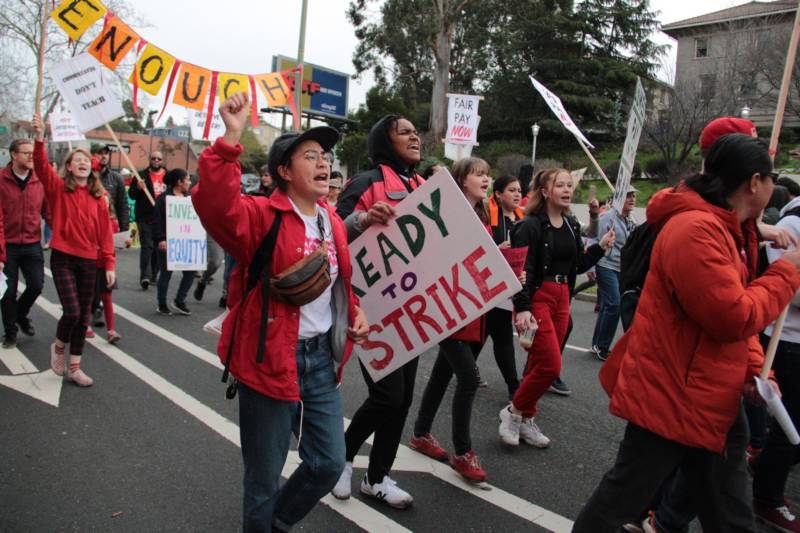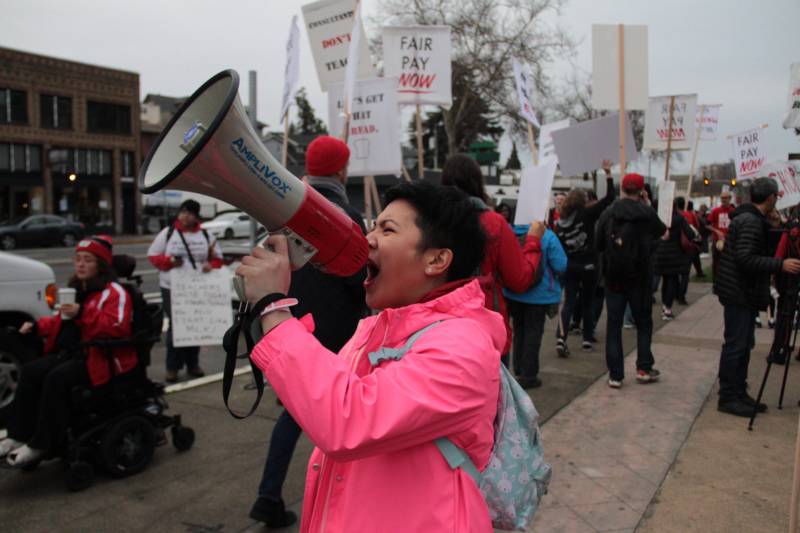If the strike does come to pass, Sasaki said schools will remain open using emergency temporary teachers and district staff to educate the district's 37,000 students. He said the specifics of the school day will differ from school to school depending on how many regular teachers show up.
In the final step of negotiations as mandated by state law, a neutral fact-finder appointed by the state released a non-binding report of recommendations to the union and district on Friday. Sasaki said the district believes the report provided a "good foundation" for finding a solution without a strike.
The district’s latest public offer included a salary increase of 5 percent over three years and marginal class-size cuts for some grades and classes. It’s also offering a special education class size cap of 15 students per teacher.
That's a far cry from teachers' demands for a 12 percent pay increase over three years, graduated class-size reductions over the next two years and deeper class-size reductions in schools where 75 percent or more of students are low-income, foster youth, homeless or English learners. They're also asking for smaller caseloads for support staff like nurses, counselors and therapists.
Najeeb Khoury, the neutral fact-finder, recommended a new contract that would last through the 2019-2020 school year and would include 3 percent pay increases over the first two years and reopen talks for a salary increase in the third year. However, he also encouraged the two sides to explore a contract that would run through the summer of 2021 and could include greater salary increases.
Oakland teachers are among the lowest paid in the Bay Area, even when taking benefits into account, according to an analysis by School Services of California, a consulting firm.
“California’s current education funding system is complicated and flawed in a number of ways," Khoury wrote in his report. "These flaws make finding resolutions to this contract and other teacher contracts throughout the state very difficult."
Khoury agreed that cutting class sizes would improve the district's poor teacher retention, but only recommended reducing classes across the board by one student by July 2020, with implementation happening at the highest-needs schools first.
The disagreements between the teachers and the district are exacerbated by OUSD's roughly $30 million budget deficit, which it has to significantly reduce to avoid being taken over by the state. To help cut costs, the district has proposed closing and consolidating up to 24 of its 87 school sites, a plan that’s proven highly controversial.
Teachers and parents who spoke at the announcement took particular aim at the district's decision to encourage the proliferation of and coordination with charter schools in Oakland, in line with what's known as the "portfolio model."
"In these competition-based portfolio districts, schools compete against each other for resources and support, creating a system of haves and have-nots," Brown said. He decried billionaire supporters of the model including Netflix founder and CEO Reed Hastings and Microsoft founder Bill Gates.
The foundation run by Gates and his wife Melinda was behind an earlier education reform effort undertaken by the district to create smaller schools in hopes of improving outcomes. Now lacking private funding from the Gates, OUSD is looking at closing up many of those small schools as part of its budget crisis.
"The black and brown families in Oakland have suffered enough displacement," said Clarissa Doutherd, the parent of a fifth-grader at Laurel Elementary School. "Our public schools should stay open. This is a direct attack on our families." Doutherd and other parents at Saturday's news conference encouraged families not to cross the picket lines in a show of solidarity with teachers.
"What we see right now in Oakland public schools is exactly what a billionaire district looks like," said Ismael Armendariz, a special education teacher and first vice president of OEA. "I'm ready to strike for our kids, and I'm ready to strike for the schools Oakland deserves. The choice is clear: You can stand with the billionaires or you can stand with the community."
Khoury's fact-finding report also noted the impact charter schools have had on the district.
"I have no doubt that charter advocates and indeed charter policies are driven by a desire to increase options for disadvantaged children," he wrote. "Unfortunately, there are ways that the current system creates an unlevel playing field for traditional public schools and undermines those districts serving the very same disadvantaged children that charter advocates seek to aid.”
As negotiations over teacher pay and school closings have heated up in recent months, so have tensions. Teachers held two separate “sick outs” this year without union approval, and on Feb. 8, students staged a similar event.
"Unless there are dramatic changes to the district’s approach including spending money on students and spending money for more nurses and counselors, lower class size and a living wage that will keep experienced teachers in Oakland classrooms, we will strike on Feb. 21," Brown said to loud applause.

